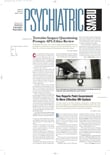Staff of the Outreach and Engagement Project (O&E) at the Connecticut Mental Health Center (CMHC) in New Haven can claim a number of successes.
Not the least of these victories is that both city and state officials agreed to fund the program after a six-year federal grant ended in 1999.
The Substance Abuse and Mental Health Services Administration funded the project, then called ACCESS, in 1993 as part of a multicity demonstration effort to determine the effects of service integration on care for homeless people with mental illness.
Frequently, the end of federal funding for a demonstration program results in the end of services and a staff left with no resources to implement the lessons learned. The O&E Project is one of only three of the original 18 ACCESS demonstration projects still in operation.
The project, in fact, has expanded because of support from the Connecticut Department of Mental Health and Addiction Services (DMHAS) and the city of New Haven and now has a budget of over $1 million.
Project Director Deborah Fisk, who was one of the first three outreach workers, described an evolutionary process in which staff tried different approaches to persuade homeless people to seek treatment for mental illness and to access supportive services.
They faced issues that had received little attention in the literature about outreach to this population.
“We had problems related to professional boundaries and ethics,” she said. “We would approach a client in a soup kitchen, not realizing that we were `outing' him as a user of our services to the other people there.”
Staff were giving their own money to clients because of the level of need.
Today more than half of the O&E staff are recovering from mental illnesses, including addiction disorders. Many of these staff members, who are called peer specialists or workers, have also been homeless.
Fisk initially was skeptical about adding a peer specialist to the team, but did so because it was a condition of the grant. She recognized the power of the concept when she heard a homeless woman tell the peer specialist,“ I want to be like you. What do I have to do to get a job like yours?”
Integrating peer specialists into the team and other aspects of the program brought new challenges.
“Workplace discrimination is pervasive against people with mental illness,” Fisk said. It can even occur at a setting such as a community mental health center.
Peer specialists told about instances of overt discrimination, such as being the only team member expected to make coffee and of being excluded from routine social events such as lunch gatherings.
They also talked about more subtle problems. “I feel cut off from both groups,” one specialist told Fisk. “I'm alone in the middle.”
A peer specialist might find herself in a professional role at a meeting with her therapist or former therapist.
Fisk advocates open discussion and exploration about these issues and recognizes the need for training staff about them.
She and other staff members began to publish articles about various issues concerning the employment of peer specialists and providing outreach in journals such as Psychiatric Rehabilitation Journal.
Staff also established closer relationships with city officials and agencies providing relevant services. Two new programs resulted from the collaboration.
New Haven funds a project that provides subsidies for homeless men and women to enter housing that is “substance free.”
A second program, jointly funded by the DMHAS and New Haven, provides a range of services, including outreach, case management, and vocational services, through a multidisciplinary team to people with substance abuse disorders.
Fisk herself has gone through an evolutionary process in terms of her career in mental health services.
She began as a night attendant doing custodial work and bed checks at a public psychiatric hospital and joined the CMHC 18 years ago as a psychiatric aid in the inpatient unit.
Fisk took particular satisfaction in helping people cope with the trauma of acute illness and hospitalization and watching them gain hope. She has since earned an M.S.W. and is working toward a Ph.D. ▪
